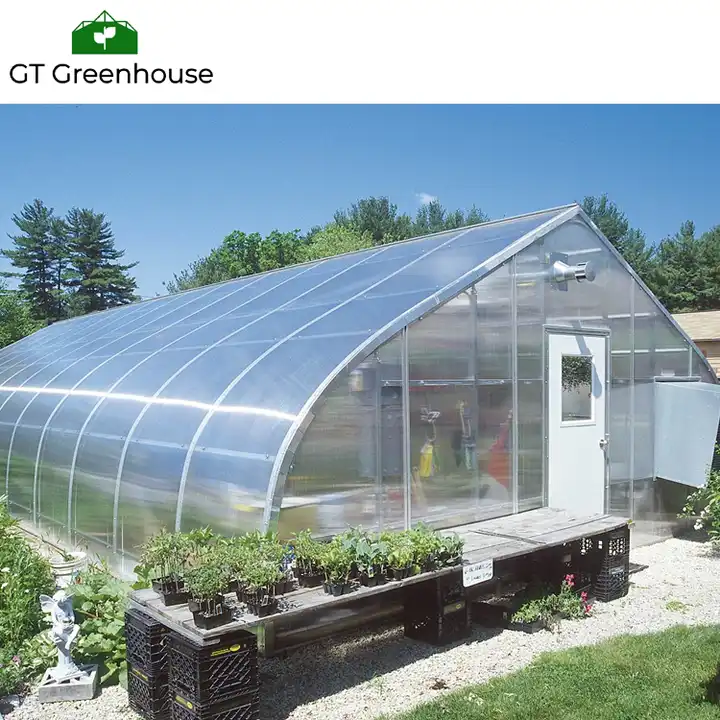Greenhouse tunnels have emerged as a game-changer in modern agriculture, providing a cost-effective and efficient solution for crop production. These structures offer numerous advantages by creating a controlled environment that protects plants from adverse weather conditions, greenhouse tunnel for agriculture extends the growing season, and maximizes crop yields. In this article, we will explore the benefits and applications of greenhouse tunnels in agriculture.

Extended Growing Season:
One of the primary advantages of greenhouse tunnels is their ability to extend the growing season. By creating a protected microclimate, greenhouse tunnels shield crops from frost, wind, and extreme temperatures, allowing farmers to start planting earlier in the spring and continue harvesting well into the fall. This extension of the growing season enables farmers to cultivate a wider range of crops and increase overall productivity.
Protection from Adverse Weather Conditions:
Greenhouse tunnels act as a shield against unpredictable weather conditions, including heavy rains, hailstorms, and strong winds. The durable covering material provides a barrier that protects crops from damage caused by harsh weather, reducing the risk of yield loss and crop failure. Moreover, the controlled environment within the tunnel helps maintain stable temperature and humidity levels, ensuring optimal conditions for plant growth.
Pest and Disease Management:
Greenhouse tunnels offer an added layer of defense against pests and diseases. The enclosed structure provides a physical barrier that prevents the entry of common pests, including insects, birds, and small animals. This reduces the need for chemical pesticides and promotes natural pest control methods. Additionally, the controlled environment within the tunnel helps minimize the spread of diseases, as it restricts contact between crops and external pathogens.
Improved Crop Quality and Yield:
The controlled environment of greenhouse tunnels allows farmers to have precise control over various growth parameters, such as temperature, humidity, light, and irrigation. By optimizing these factors, farmers can create ideal conditions for plant growth, resulting in improved crop quality, uniformity, and increased yields. The ability to customize the environment within the tunnel enables farmers to cater to the specific needs of different crops, maximizing their potential.
Water Conservation:
Greenhouse tunnels are designed to be water-efficient. The enclosed structure reduces water evaporation, minimizing water loss and optimizing irrigation efficiency. Furthermore, the ability to control the irrigation system within the tunnel ensures that plants receive the right amount of water at the appropriate times, reducing water wastage and conserving this precious resource.
Cost-Effectiveness:
Compared to traditional greenhouse structures, greenhouse tunnels offer a cost-effective alternative for farmers, especially for small-scale operations. The construction and maintenance costs of tunnels are generally lower, making them more accessible to farmers with limited budgets. Additionally, the compact size of tunnels allows better space utilization, enabling farmers to cultivate more crops in a smaller area and potentially increase their profits.
Versatility and Scalability:
Greenhouse tunnels are versatile structures that can accommodate various types of crops, including vegetables, herbs, flowers, and small fruits. They can be easily customized and adapted to suit the specific requirements of different crops. Moreover, greenhouse tunnels are scalable, allowing farmers to expand their operations gradually as their needs and resources grow.
Organic and Sustainable Farming:
Greenhouse tunnels provide an ideal environment for organic and sustainable farming practices. The controlled environment reduces the reliance on synthetic pesticides and fertilizers, making it easier for farmers to adopt organic cultivation methods. Additionally, the ability to manage water resources efficiently and optimize nutrient delivery promotes sustainable farming practices and minimizes the environmental impact of agriculture.
Greenhouse tunnels have revolutionized agriculture by providing a cost-effective and efficient solution for crop production. With benefits such as extended growing seasons, protection from adverse weather, pest and disease management, improved crop quality, water conservation, and cost-effectiveness, these structures have become a valuable asset for farmers worldwide. By harnessing the advantages of greenhouse tunnels, farmers can enhance productivity, optimize resource utilization, and contribute to sustainable and resilient agricultural practices.